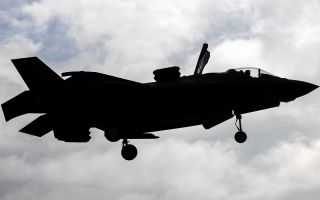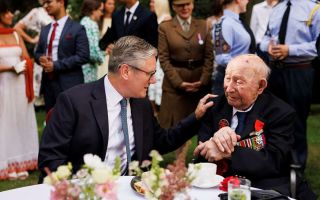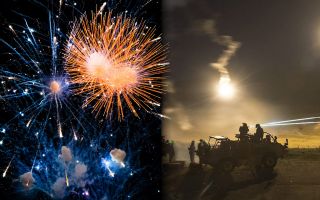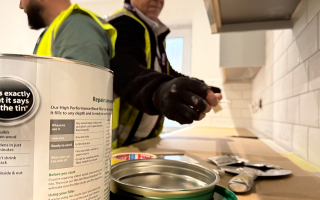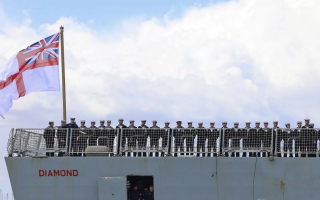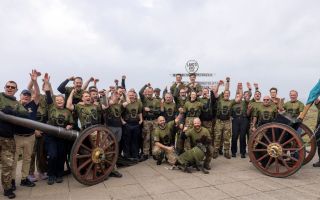Tri-Service
Russia Withdraws Warship Refuelling Request To Spain
Russia has withdrawn its request to refuel warships destined for Syria in Spain amid mounting pressure on the Spanish government to block the stop.
Warships led by the smoke-belching aircraft carrier Admiral Kuznetsov were expected to take on fuel and supplies at the port of Ceuta after passing through the Straits of Gibraltar.
But Michael Fallon warned that Britain would be "extremely concerned" if a NATO member assisted a carrier group that ended up bombing Syrian civilians.
The Defence Secretary said countries in the alliance must "stick together". Speaking in Brussels, where NATO defence ministers are meeting, Mr Fallon said:
"We would be extremely concerned if any NATO member started to assist a Russian carrier group that ended up in the eastern Mediterranean bombing Syrian civilians.
"On the contrary, NATO should be sticking together and reassuring its members and that's one of the reasons we are deploying Typhoons to the Black Sea region to provide exactly that kind of reassurance and solidarity.
"NATO needs to stick together."
Russia's embassy in Madrid later said the federation had withdrawn its refuelling request.
It comes after Royal Navy vessels last week monitored Russian warships as they moved through the English Channel.
The fleet was shadowed by the Navy as it passed through the Dover Strait - one of the busiest seaways in the world.
NATO said the prospect of Russia's only aircraft carrier heading to the region did not "inspire confidence" that Moscow is seeking a political solution to the Syrian crisis.
A UK government spokesman said:
"Access to Spanish ports is a matter for the Spanish authorities. HMG [Her Majesty's Government] has previously expressed concerns to the Spanish government about its hospitality to the Russian Navy when we have concerns about Russia's military activity… We are clear that the UK's relationship with Russia should not be business as usual."
More than 60 Russian naval vessels have refuelled and resupplied in Spanish ports in recent years, according to the SNP.
But Prime Minister Theresa May sidestepped calls to explicitly demand that Spain rejected Russian refuelling requests. She told MPs:
"Of course, on the high seas they are able to travel as they wish, although of course when they went through the English Channel they were accompanied by Royal Navy vessels as they went through.
"What we have seen, sadly, is that the Russians are already able to unleash attacks on innocent civilians in Syria."
"What matters is that we put pressure on Russia to do what everybody agrees is the only way that we are going to resolve this issue, which is to ensure that we have a political transition in Syria, and that's where we should focus our attention."
Amnesty International UK said there should be "no question" of countries assisting Russian warships. Its Syria campaign manager, Kristyan Benedict, said:
"There should be no question of other countries refuelling these vessels or in any other way assisting Russia's warships as they sail toward Syria.
"The Russian military's record of attacks on schools, hospitals and civilian homes in Aleppo and elsewhere in Syria is notorious. Third-party countries must avoid becoming complicit in any future Russian attacks on Syria carried out in the eastern Mediterranean."
Mrs May's spokeswoman told a Westminster briefing that Britain's ambassador in Madrid had raised the matter with the Spanish government in the past 24 hours.
"We have concerns about this. We have raised them with the Spanish, and we will continue to monitor the situation. Throughout, we have been clear that we want to see countries working together to increase the pressure on Russia to end their bombardment of Aleppo."
Russian defence minister Sergei Shoigu said in September that the Admiral Kuznetsov-led Northern Fleet would be joining a taskforce in the Mediterranean.
According to the Russian news agency Tass, he told a defence board meeting that the plan was to bolster the Mediterranean fleet's "combat capabilities".
A statement from the fleet to the agency on October 15 said the group also consisted of the Pyotr Velikiy battlecruiser, the Severomorsk anti-submarine ship, the Vice-Admiral Kulakov destroyer and other support vessels.
Spanish Prime Minister Mariano Rajoy shakes hands with Vladimir Putin at the G20 Summit in 2013
Soviet-Spanish relations were incrementally re-established in 1963 after they'd been ended at the close of the Spanish Civil War in 1939. This process was completed in 1977, two years after the death of nationalist dictator Francisco Franco, who'd ruled Spain since the end of the conflict.
According to the Kremlin’s website, Mr Putin and Spanish Prime Minister Mariano Rajoy looked towards greater Russian-Spanish bilateral cooperation at the G20 Summit in Saint Petersburg in 2013.
But despite this, the G20 Summit that year was dominated by the issue of chemical weapons use in Syria, whose government Russia has politically supported since the beginning of country's civil war in 2011, with military aid, and through direct military involvement since September last year.
Eleven countries at the summit, including Spain, endorsed a White House statement that called for condemnation of the chemical weapons attack that had occurred that year. It said evidence pointed to the Syrian government being culpable, and urged a strong response from the international community.
In 2008, trade between Spain and Russia totalled €2 billion and the two signed an energy agreement in 2009.
Since the trade embargo with Russia began in 2014, many countries within the EU have been affected. An EU report in late 2014 listed Spain as one of 11 countries (including the UK) potentially hardest hit by the embargo in its perishable products sector.
Cover image: Russian aircraft carrier the Admiral Kuznetsov.


